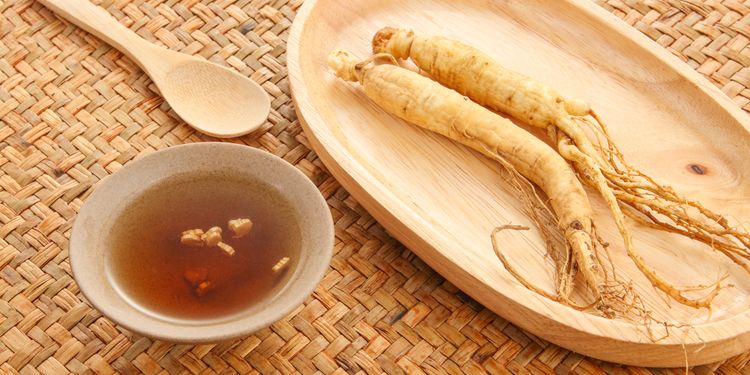Why I Immediately Turn to This Tea When I’m Stressed Out

Stress and I are old friends.
What started with grades and girls in my middle school years has since evolved to job interviews, taxes, and medical insurance.
After years of managing stress, I like to think I’ve become something of a connoisseur of stress-reduction tools! Meditation, breath work, dance, and supplements have all served me well over the years.
A few weeks ago, however, when family was visiting for the holidays and I was seriously stressed out, all my normal tools were failing me. For the first time in years, I felt utterly incapable of calming myself down.
Luckily, I reached out to a friend, and she made the perfect recommendation. I followed her advice and made myself a cup of something I had never heard of before, but it turned into one of my go-to stress-reduction tools: ginseng tea.

Ginseng Tea Cuts Down Stress
Ginseng root has been used as an herbal medicine in Asia and North America for thousands of years. These days, more and more studies are showing just how potent an anti-stress tool ginseng truly is!
One study showed that 400mg of ginseng improved both overall mood and mental function (in the form of arithmetic). Another study showed that ginseng not only reduces stress, but effectively treats stress-induced disorders such as ulcers, imbalanced adrenal glands, and high plasma glucose levels.
Ginseng is such a powerful tool to relieve stress because it’s an “adaptogen.” Adaptogens form a special class of medicinal plants. Rather than serve specific functions in your body, adaptogens instead act as general helpers and can adapt themselves to help your body’s specific needs.
Thus, ginseng can also act as an antioxidant, lower blood pressure and cortisol levels, and improve the health of your adrenal system. By balancing and strengthening your adrenal system, which controls the hormones released in your body, ginseng helps you better manage and cope with stress and anxiety.
Overall, ginseng helps your body normalize its functions and find a healthy balance, calming you down and energizing you simultaneously.
Ginseng can also help you manage and reduce stress by way of improving brain and lung function.
Ginseng has been shown to stimulate brain cells and improve concentration, memory, and mental performance. A better working brain means clearer thinking and better mental control! Clearer thinking is a vital tool in times of stress, whether you use it to reason your way out of a stressful situation or talk yourself down and remind yourself that you don’t need to be so stressed out in the first place!
Improved lung function can also help reduce stress by improving your breathing and increasing oxygen flow into your body. Just think— how much better do you feel in a stressful situation after a few deep breaths?

Other Benefits of Ginseng
Ginseng has also been shown to:
- Reduce inflammation
- Repair brain damage
- Prevent cancer and inhibit tumor growth
- Inhibit the growth of viruses like influenza, HIV, and rotavirus
- Treat lung infections and diseases like cystic fibrosis and COPD
- Help with weight loss
- Boost metabolism
- Reduce blood sugar levels
- Increase glucose tolerance
- Boost the immune system
- Regulate and improve the performance of immune cell function
- Act as an aphrodisiac
- Treat erectile dysfunction
- Possess anti-microbial and anti-bacterial properties

How Do I Make Ginseng Tea?
While you can buy ginseng tea bags at most supermarkets, you’ll find that making the tea yourself with ginseng root will produce much more powerful health benefits.
First, you need to choose what type of ginseng you want to use. There are 11 species of ginseng and two main types: American and Asian (aka Korean). Dr. Axe recommends using American ginseng during hotter months and Asian ginseng during colder months.
Fresh ginseng root can be difficult to come by, so feel free to use dried or powdered root to make your tea. The steps are as follows:
- If using the whole root, peel it first.
- Place 1 TBSP of root shavings or powdered root into a metal tea ball/filter.
- Bring the water to a boil and then let cool for a few minutes.
- Pour the water into a cup or pot and steep the ginseng root in the water for 5 minutes or so.
- Drink your tea!
- Optional step: eat the root shavings for extra health benefits.
Chinese herbal medicine practitioners recommend a cup of ginseng tea a day for people over 40.
For the rest of you, a hot cup when you’re stressed is a great way to go!
NOTE: Ginseng can cause insomnia and dizziness for some people and headaches, dizziness, and stomachaches in high doses or after long-term use.
Dr. Axe recommends that women who are pregnant or breastfeeding avoid ginseng, and people with diabetes should talk to their doctor before using ginseng.
Ginseng may interact with blood-thinning medications, antidepressants, antipsychotics, stimulants, morphine, and diabetes medications. If you’re on any of these medications, talk to your doctor before using ginseng.

Summary
I’ve come to accept that, from time to time, life is going to seriously stress me out!
Of the many supplements, teas, breathing exercises, and other stress-reduction tools I’ve tried over the years, ginseng tea is easily one of the best tools I’ve come across.
So, the next time you’re feeling anxious or stressed, give it a try!
It’s easy to make and benefits your body and mind in many ways besides just reducing stress.
What’s not to like?
